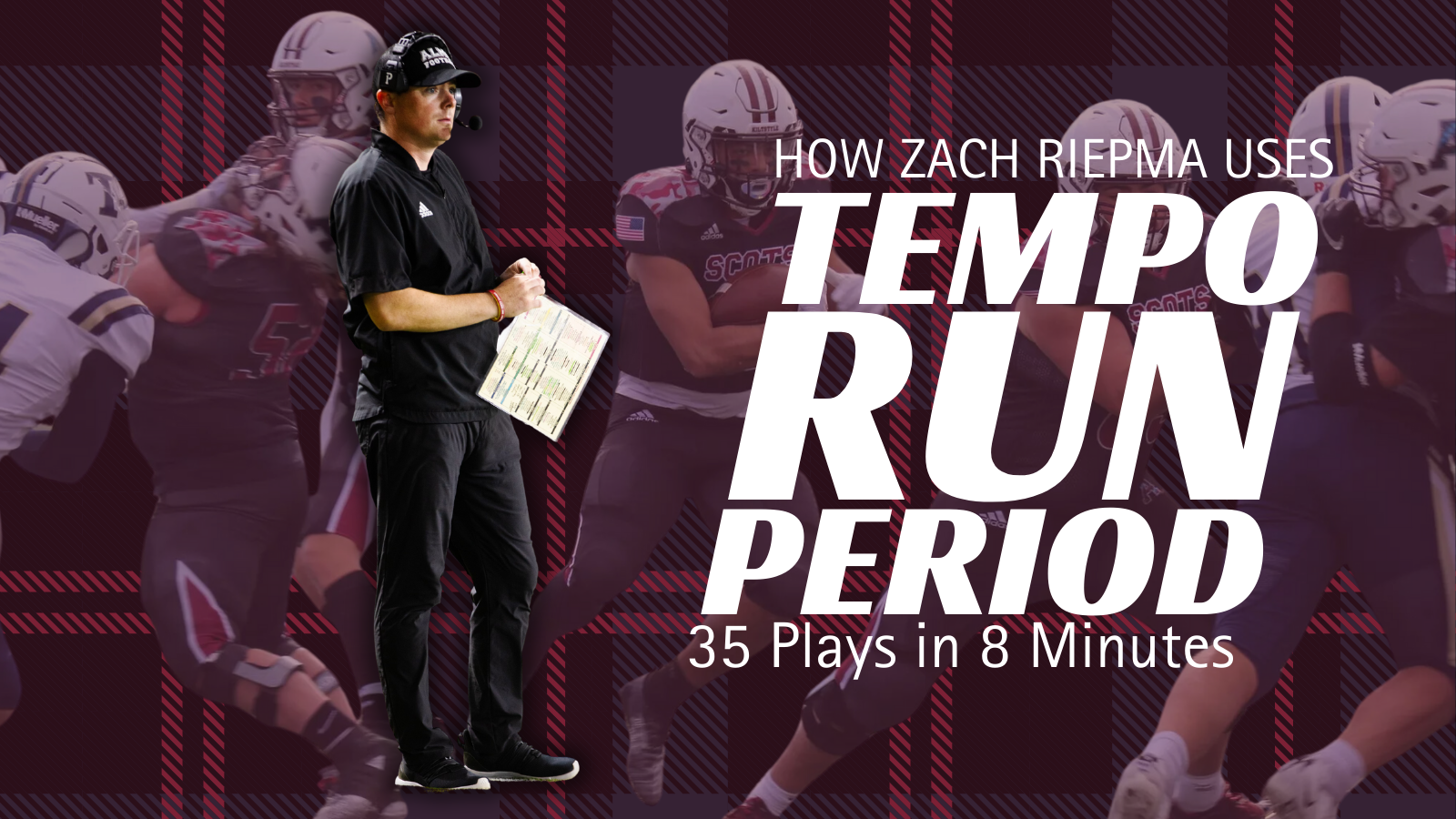
At Alma College, Offensive Coordinator Zach Riepma runs a temnpo offense that capitazizes on running their plays through a variety of personnel groups. In order to turn that offense into a fine-tuned machine that executes at a high level on game day, Riepma uses a high-intensity practice drill known as the Tempo Run Period. This drill simulates game-day conditions, improving both the mental and physical readiness of his players. By replicating the fast pace of actual games, Riepma builds his team’s endurance, resilience, and quick decision-making abilities.
Purpose of the Tempo Run Period
Riepma immerses his players in a high-repetition, time-constrained environment during the Tempo Run Period. Over eight minutes, the offense executes around 35 plays. Players must move quickly, understand their assignments, and maintain high performance under physical stress in what Riepma describes as “controlled chaos.” He explains, “It’s controlled chaos. We’re cranking it up… It’s, again, just flying around.”
Setting Up the Drill
The drill covers core plays from Alma’s primary offensive formations, focusing especially on the 11-personnel setup. Players practice core run concepts and run-pass option (RPO) plays, with scripts that span different field positions to ensure versatility. Riepma shares, “It’s really just an inside run period, and it ends up being kind of eight-on-eight by the end of it.”
Execution and Controlled Chaos
Riepma’s team operates at a rapid pace, with the scout team providing mostly base defensive looks. As soon as one play ends, Riepma signals the next one, keeping players on high alert. Players sprint on and off the field in a six-play rotation, simulating the high-energy transitions of real games. “The plays are coming as soon as the next play is done. The next play is getting signaled in,” Riepma describes.
Balancing Speed and Effectiveness
The drill moves faster than most actual games, which Riepma intentionally designs to prepare players for high-pressure situations. This speed creates chaos, but it trains players to adapt quickly and stay composed. Riepma acknowledges, “It’s probably faster than you’re ever going to truly be able to get a play off in a game.” His approach ensures players can handle the game-day intensity, even when defenses aren’t fully set.
Simulating Real Game Situations
Riepma replicates the unpredictability of games by introducing controlled chaos. Players must execute their assignments effectively, even in difficult conditions. Riepma emphasizes, “Trying to kind of stimulate some of those chaotic mess situations is a part of that drill and has been helpful for us.” The drill challenges players to think and perform under pressure, mimicking the reality of game situations. When an offense moves fast procedurally, the defense will make mistakes in alignment forcing the offense to adapt on the fly. The defense is not always where they are expected to be.
Sharpening Physically and Mentall
Riepma’s Tempo Run Period has become a key part of his coaching at Alma College. This drill sharpens both the physical and mental skills of his players, preparing them to thrive under the high-pressure, fast-paced conditions of collegiate football. By embracing this type of training, Riepma ensures his team is always ready for game day, equipped with confidence and resilience.
D3 Offensive Coordinator of the Week
Zach Riepma was named the Coach and Coordinator D3 Offensive Coordinator of the Week in Alma’s 67-14 win over Olivet. Jason Couch is the head coach, and the offensive assistants are Jason Palmanteer, Matther Yuncker, Teddy Spooner, Alexander Dean, and Josh Dukes.
Notable Stats
Zach Riepma | Alma | 67-14 vs. Olivet
- 580 yards on only 54 plays (10.7 ypp)
- 16-20 passing, >19 yards per attempt
- Only faced 8 third downs all game, converted 6 into first downs
- Two different receivers with >100 yards receiving



